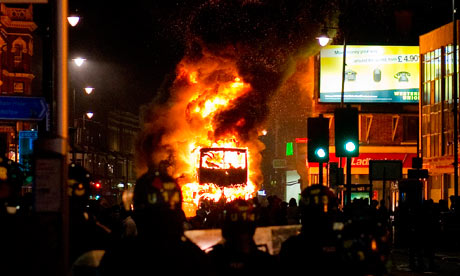
What's happening in London sounds like it's become genuinely quite scary and, along with everyone, I'm at a bit of a loss to know what's caused it.
Clearly part of it is just the apparent impunity. If you were convinced that nicking a £10 top from Primark would land you in 100 hours of community service, you wouldn't do it. Likewise, setting fire to bins and buses and Carpetright and Greggs the Baker. But it's become very clear that the police are unprepared, outmanoeuvred and possibly undertrained to deal with a situation on this scale.
In those circumstances, there seems to be a Wizard of Oz thing going on: rioting kids have discovered that the feared Wizard is a frail old man with a megaphone. The authorities having lost control of the situation, lawlessness spreads like an infection.
Another thing, obviously, is the nihilistic selfishness of the rioters. But without wanting to sound too much the cookie-cutter bleeding-heart liberal, I have to wonder: why here? Why now? If the perpetrators were always this mindless and selfish, why was it not kicking off in Croydon and Peckham five years ago, or ten, or 20?
I don't imagine those involved in this violence are vastly worse off than they've ever been: the rise in unemployment in the UK since 2008 has been fairly slight by international standards, and London is doing far better than the rest of the country. But clearly, with western economies in the doldrums for three years and now tanking again, there's an end-times mood in the air, that late 1970s feeling that the attachments between anti-social behaviour and its consequences have frayed.
Think of this over the span of history and it's not so surprising. States have always bought the acquiescence of their populations through progressively granting them benefits, be they voting rights, welfare states, moves towards racial equality, or just a general sense of growing prosperity. When people sense that those benefits are being taken back--that they and their generation are being expected to put up with diminished prospects to pay for the mistakes and excesses of others--they don't see why they should hold up their end of the bargain.
That certainly doesn't excuse what these scumbags have done to the city I grew up in. Wood Green--near where we used to live, and one of the first places to get smashed up--was always a bit chaotic but it had that London disorder I've always loved. It was rough around the edges but it was an optimistic place too, full of the bustle of people with ambitions, and energy, and a sense of humour; nothing like the tired, depressed high streets I've seen in other parts of the country. I'm sure it will ride out this setback, but it pains me that people did this, there and across the capital.
I expect that, in a very British way, society will muddle through this and 10 years from now these riots will be viewed with a vague amazement, the way we now view the truck drivers' fuel blockade that almost brought the country to a halt in 2000.
Still, we should remember how we got here. Early modern society was violent and brutal by modern standards, and also far more insecure and unequal. Over the past few centuries, the powerful have traded some of their wealth and influence so that they could live in a more stable society. That trend peaked a generation ago, and so far we've managed to patch over the fraying of this social contract with progressive taxation, regeneration programmes, and credit card debt.
The financial crisis should have been an opportunity to reverse that deterioration, but I fear it has become the opposite. There is a pretty simple solution to social unrest through the ages, and it involves jobs, prospects, and improving standards of living.
But in this crisis I fear we are faced with thugs who feel contempt for a society they feel offers them little hope; demoralised police and emergency workers who see little reason to risk themselves for a government that wants to cut their numbers; and a general population reeling from the general social and financial disorder. It's the loss of confidence again: both thugs and financial markets think the world is falling to bits, and that our institutions can't handle what's happening to us. I think they're wrong.
No comments:
Post a Comment